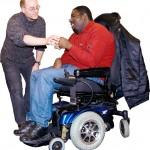
Fear and anxiety about medical procedures can be a barrier to accessing healthcare for people with learning disabilities. In particular, fear of needles can mean that blood tests may not be able to be taken and this can prove a significant clinical challenge. The researchers in this case study used a changing criterion design, they [read the full story…]









